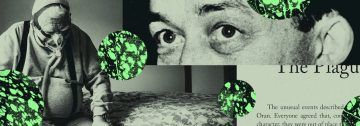Laura Marris in The New York Times:
 “The Plague” did not come easily to Camus. He wrote it in Oran, during World War II, when he was living in an apartment borrowed from in-laws he disliked, and then in wartime France, tubercular and alone, separated from his wife after missing the last boat back to Algeria. Unlike the shorter, harsher sentences of “The Stranger,” which Sartre quipped could have been titled “Translated From Silence,” the sentences of “The Plague” bear witness to the tension and monotony of illness and quarantine: They stretch their lengths to match the pull of anxious waiting. By the time the book was published in 1947, writers were looking for a way to bear witness as well to the Nazi occupation of France, and “The Plague” was championed as the novel of the occupation and the Resistance. For Camus, illness was both his lived experience and a metaphor for war, the creep of fascism, the horror of Vichy France collaborating in mass murder.
“The Plague” did not come easily to Camus. He wrote it in Oran, during World War II, when he was living in an apartment borrowed from in-laws he disliked, and then in wartime France, tubercular and alone, separated from his wife after missing the last boat back to Algeria. Unlike the shorter, harsher sentences of “The Stranger,” which Sartre quipped could have been titled “Translated From Silence,” the sentences of “The Plague” bear witness to the tension and monotony of illness and quarantine: They stretch their lengths to match the pull of anxious waiting. By the time the book was published in 1947, writers were looking for a way to bear witness as well to the Nazi occupation of France, and “The Plague” was championed as the novel of the occupation and the Resistance. For Camus, illness was both his lived experience and a metaphor for war, the creep of fascism, the horror of Vichy France collaborating in mass murder.
But unlike many of his contemporaries, Camus took the long view. The heroism of the Resistance was less important to him than how humanity could be restored after the war. In his speech “The Human Crisis,” delivered at Columbia University in 1946, he pushed for a postwar return to the human scale, calling hatred and indifference “symptoms” of this crisis. He refused to let his country off the hook for its role in spreading this illness: “And it’s too easy, on this point, simply to accuse Hitler and say that the snake has been destroyed, the venom gone. Because we know perfectly well that the venom is not gone, that each of us carries it in our own hearts.”
While he knew that people carried traces of hatred, he was also hoping those traces could be disarmed as cultural antibodies. In this same speech, he called for creating “communities of thought outside parties and governments to launch a dialogue across national boundaries; the members of these communities will affirm by their lives and their words that this world must cease to be the world of police, soldiers and money, and become the world of men and women, of fruitful work and thoughtful play.”
More here.
